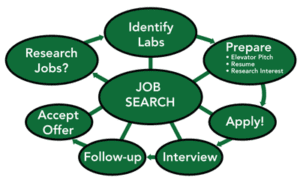 Beginning to think of a postdoc? The unorganized nature of this process can be challenging to understand, especially since it can vary among fields. As I began my applications for postdocs in genomics 1.5 years ago, I relied on pointers from multiple trainees who had successfully navigated the process. In part 1 of this two-part series, we’ll discuss critical considerations and tips for applying to postdoc positions in the genetics field, focusing on the application process that precedes the interview. Part 2 will focus on the interview itself and post-interview process.
Beginning to think of a postdoc? The unorganized nature of this process can be challenging to understand, especially since it can vary among fields. As I began my applications for postdocs in genomics 1.5 years ago, I relied on pointers from multiple trainees who had successfully navigated the process. In part 1 of this two-part series, we’ll discuss critical considerations and tips for applying to postdoc positions in the genetics field, focusing on the application process that precedes the interview. Part 2 will focus on the interview itself and post-interview process.
When Do You Start?
There are two definitions of ‘start’. The process of thinking about applications starts much earlier than when you actively apply. It is important to do some soul-searching—do you want to do a postdoc? What are the scientific questions you want to work on? What are the environments you thrive in and the ones in which you don’t? What do you want to get out of a postdoc? It could be papers, technical skills in a particular domain, or managing projects independently. What do you want to do after your postdoc? Letting these questions marinate in your mind for months can help you apply with a clear goal.
I wanted to switch to an adjacent research area after grad school, and tried to get a broader sense of current genetics research. I signed up to meet with each of my department’s visiting speakers during the final year of my PhD. This helped me connect with professors who were looking for postdocs, while giving me a better sense of important questions in other fields. Talking to faculty in your department (starting with your advisor) is also always helpful—many are generous with advice and could offer information about labs not otherwise found easily.
Once you are ready, you can start applying anywhere from two months to a year before graduating. International students may want to start closer to nine months earlier so the pressure of acquiring both a job and visa doesn’t reach its peak near graduation.
Finding Labs and Making Connections
Some useful resources to find postdoc openings include the #ASHGtrainee Twitter handle and ASHG Career Center, departmental mailing lists, and faculty websites. However, it’s been said before, and I’ll say it again—do not wait for job ads before reaching out to people you want to work with.
Certain labs may receive many postdoc applications. One way to make your application stand out is to meet with PIs at conferences. In the final year of your PhD, commit to attending conferences and make an effort to meet with PIs you’re interested in working with. Scheduling conference meetings beforehand is helpful, especially at large conferences where you might not see them otherwise. If this isn’t possible, don’t hesitate to introduce yourself at the conference. When I’m nervous about approaching professors, I recall the best advice I received from my advisor—the worst thing that can happen is that they forget you! These meetings are particularly useful if your CV does not reflect your abilities as a scientist.
Some advisors are also happy to forward your CV to PIs you are interested in working with. This, or a call from your advisor, can ensure your application gets looked at. Otherwise, ask at least one of your recommenders to send a recommendation letter to the professor within a few days of your initial email. Also plan to send a couple follow-up emails if you don’t hear back within a few weeks—don’t be discouraged by a lack of response!
Elevating Your Application
Because landing a postdoc is also about luck and timing, you should apply broadly within the domain of your research interests. Your email should include a cover letter, CV, and statement of research interests. It is absolutely worth spending time tailoring your cover letter and research statement to each lab. Professors are more likely to take your application seriously if you are genuinely interested in their research. Consider attaching recent manuscripts or those in progress to your email (or even better, put it on a preprint server).
Do your research on grants and fellowships. If a professor receives an email requesting to collaborate on a relevant fellowship application, they are more likely to take your application seriously.
Stay tuned for part 2 of this series, in which we’ll talk about the interviewing process. As you embark upon your own postdoc hunt, remember to stay motivated and enthusiastic—a new phase in your career awaits.
